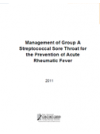The purpose of this evidence review is to provide an evidence-based summary of current New Zealand and overseas evidence to inform best practice in the management of people with Streptococcal A infection of the throat (pharyngitis) especially with the aim of preventing one of the more serious sequalae: Acute rheumatic fever (ARF).
Key Results
Key messages- Antibiotics should be initiated as soon as possible as there is no evidence to support current practice of delaying treatment by up to nine days and there is no evidence to support any other recommendation about the timing of treatment.
- Children at high risk of developing rheumatic fever should continue to receive empiric (immediate) antibiotic treatment and the presence of GAS should continue to be confirmed by laboratory culture.
- To establish asymptomatic carriage rate in the school population, where an intervention is planned, all consented children should be swabbed before and after the intervention, regardless of symptoms to allow evaluation of programme effectiveness.
- There is reliable evidence about the efficacy of rapid antigen diagnostic tests, which give a result much faster than swabbing and testing.
- Once daily amoxicillin is the first choice for antibiotic treatment for a GAS throat infection. Studies comparing amoxicillin with penicillin V report comparable outcomes. Amoxicillin is likely to achieve better compliance because of its daily dosing and ability to be taken with food compared with penicillin V’s more frequent dosing and the requirement to take it on an empty stomach.

